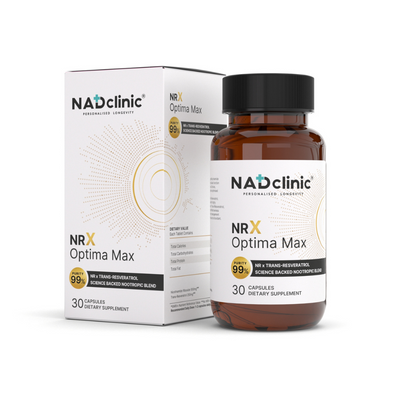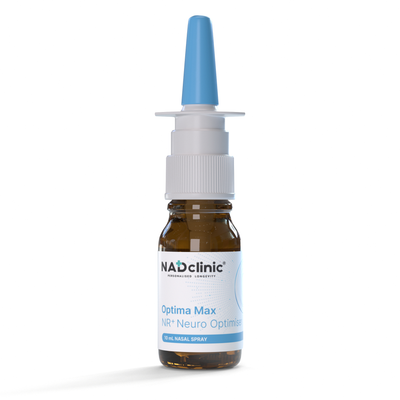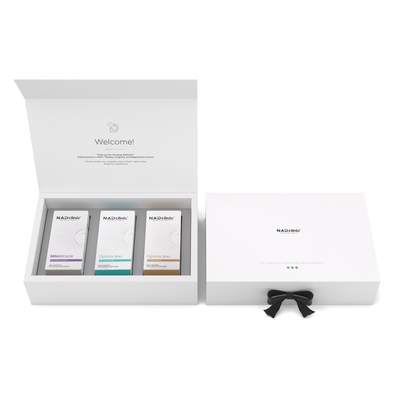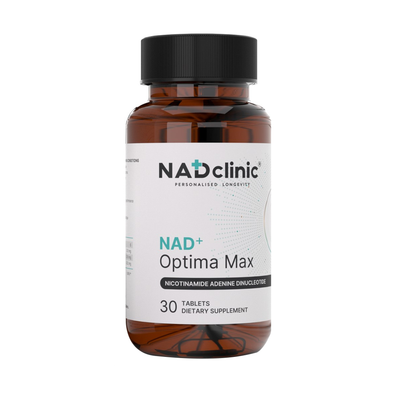You’ve tried no screens before bedtime, opened the windows to cool your bedroom, and even cut out your second cup of coffee. But there’s one thing you might not have considered that’s having an impact on your sleep quality.
Recent research suggests that NAD⁺ (nicotinamide adenine dinucleotide), a molecule found in every cell of your body, may actually play a role in supporting healthy sleep patterns. While it’s not a replacement for good sleep hygiene, optimising your NAD⁺ levels could be an important step toward more restorative rest.
The Link Between NAD⁺ and Sleep
NAD⁺ is best known for its role in cellular energy production and repair, but it also helps regulate your circadian rhythm — the internal clock that dictates your sleep-wake cycle. This is because NAD⁺ interacts with key proteins that manage your body’s internal timing system, helping coordinate essential processes like hormone release, temperature regulation and metabolism so they align with the natural day-night cycle.
When NAD⁺ levels are balanced, your circadian rhythm is more likely to function optimally, supporting:
-
Easier sleep onset at night
-
More consistent, restorative deep sleep stages
-
Natural wakefulness in the morning without excessive grogginess
Why NAD⁺ Levels Decline — And How That Affects Sleep
NAD⁺ levels naturally drop with age, but factors like stress, poor diet, alcohol consumption and lack of exercise can speed up this decline. Lower NAD⁺ can make it harder for your circadian rhythm to stay in sync, leading to disrupted sleep patterns, reduced deep sleep and greater daytime fatigue.
Poor sleep and low NAD⁺ can also create a cycle. Inadequate rest further reduces your NAD⁺ stores, which in turn can make sleep quality worse. Breaking that cycle often requires supporting both your sleep habits and your NAD⁺ levels.
Supporting NAD⁺ for Better Rest
Lifestyle factors such as regular exercise, balanced nutrition and time in natural light during the day can help boost NAD⁺ production. Nutrients like B vitamins, tryptophan and polyphenols (found in foods like berries, spinach, and green tea) can also play a positive role.
If you’re seeking more targeted support, NAD⁺ supplementation may help restore levels more effectively, especially in people over 30 or those with high-stress lifestyles. At NADclinic, our pharmaceutical-grade NAD⁺ formulations are developed for purity, safety and stability, with delivery methods like the NADSQx Smart Pen for precision dosing and ease of use.
The Takeaway
If you’re doing all the right things for your sleep but still waking up tired, your NAD⁺ levels might be worth considering. Supporting them could help fine-tune your circadian rhythm, improve deep sleep quality and leave you feeling more rested and energised.
Healthy sleep is one of the most important investments you can make for your overall well-being, and NAD⁺ might just be an underappreciated part of that equation.
Featured products
Discover our most popular items

NAD+ スマートペン 1000mg

NAD+ レベル検査キット

NRX Optima Max

Optima Max - NR 点鼻薬

Optima Max - ギフトボックスセット
続きを読む

Health benefits of NAD⁺ We all age. It’s a natural feature of life that affects every part of our body, from how we look to how we feel. But, there are ways we can slow down those telltale signs ...
続きを読む
Interested in boosting your NAD+ levels, but not sure which option to go for? Nowadays, the market is saturated with various methods to increase your bodily stores of this ‘miracle molecule’, from ...
続きを読む
